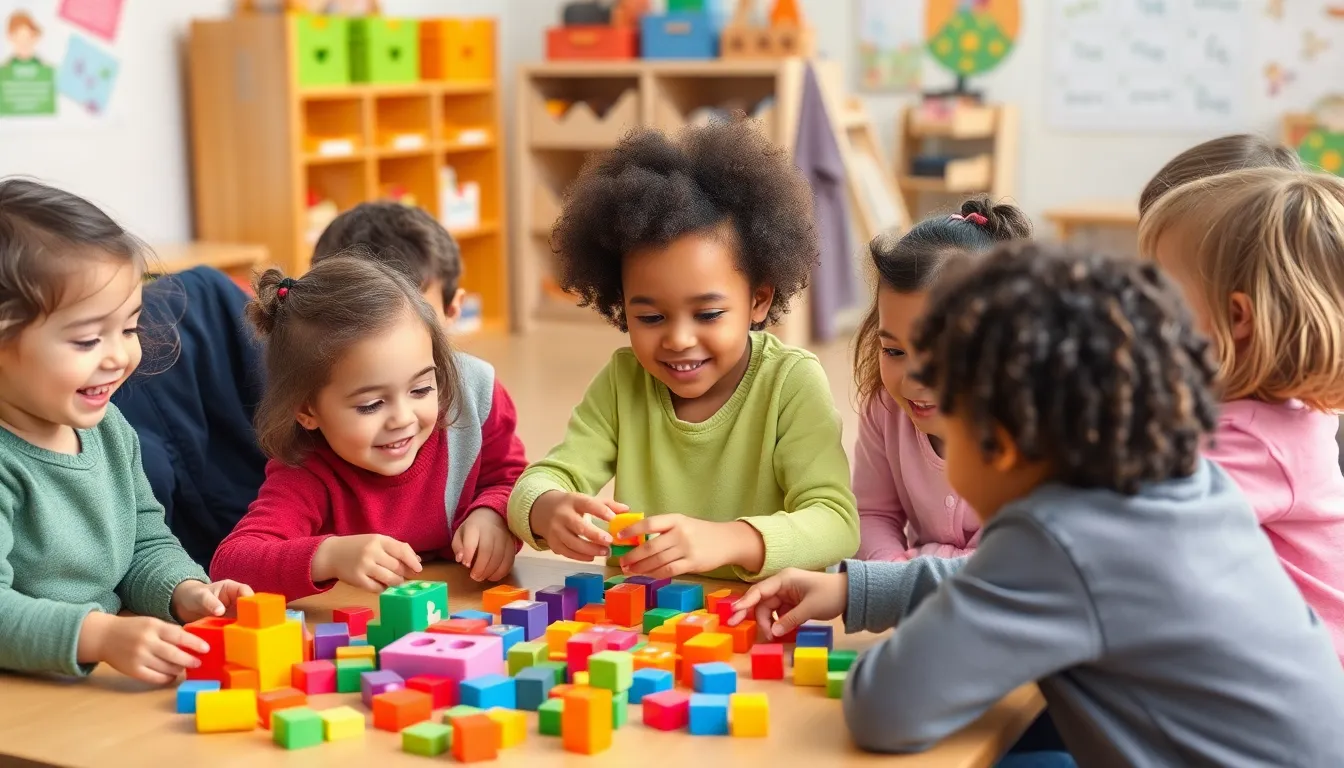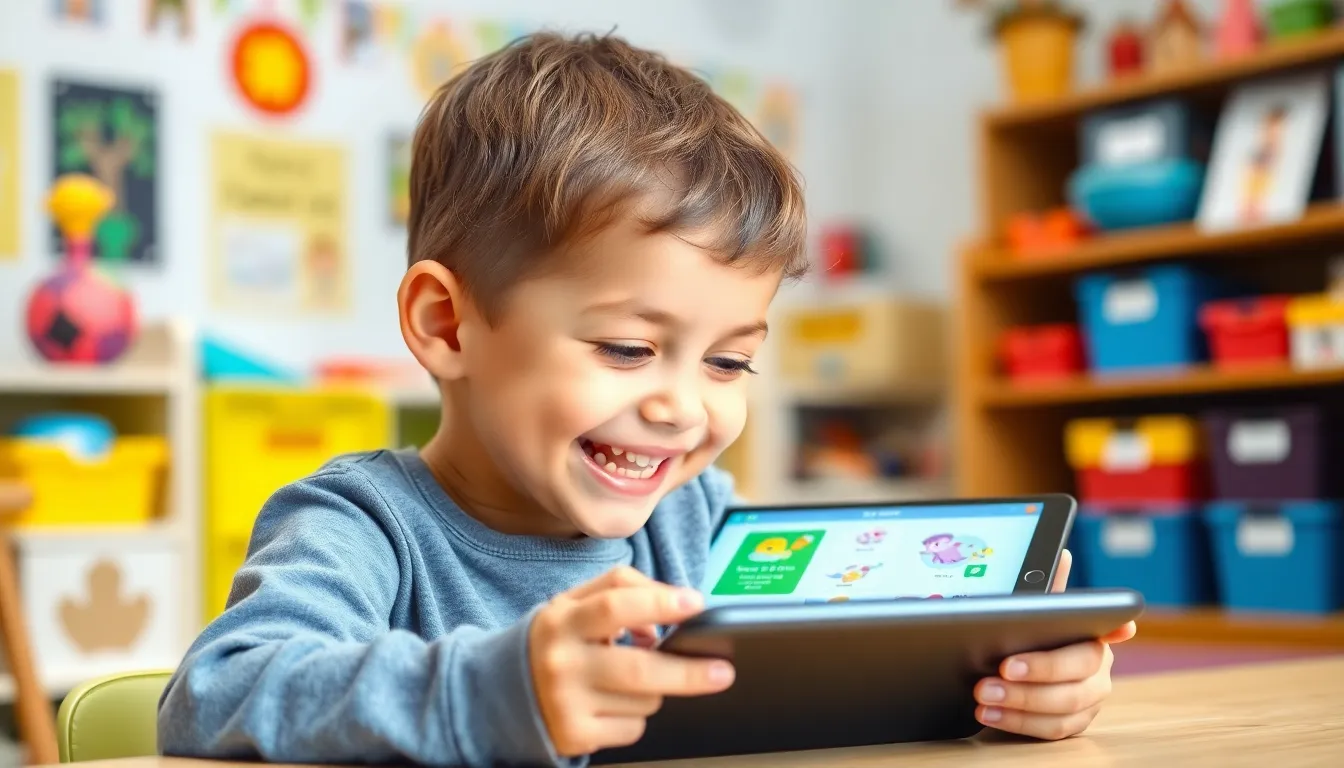In a world where math can feel more like a four-letter word than a fun challenge, toys that boost math skills are a game changer. Imagine turning your living room into a mini math lab where numbers dance and equations play tag. These aren’t just ordinary toys; they’re clever gadgets designed to sneak in some serious learning while kids think they’re just having a blast.
From colorful counting cubes to engaging board games, these toys make math as irresistible as a slice of chocolate cake. They combine entertainment with education, proving that you can have your cake and eat it too—without the guilt! So let’s dive into the world of playful learning, where math becomes a thrilling adventure rather than a dreaded chore.
Table of Contents
ToggleOverview of Toys That Improve Math Skills
Toys that enhance math skills combine education with play, making learning an engaging adventure. These products include counting cubes, which allow children to visualize numbers and understand basic arithmetic. Board games often emphasize strategy and critical thinking while reinforcing mathematical concepts through real-life scenarios.
Manipulative toys, such as building blocks, help develop spatial awareness and problem-solving skills. Puzzles that require mathematical insight challenge kids to think critically while enjoying the process. Interactive apps and digital games also foster math proficiency, providing immediate feedback that encourages progress.
Educational kits, featuring hands-on activities, allow children to explore concepts like addition, subtraction, and geometry in a tactile manner. Each toy creates opportunities for exploration, making math feel approachable rather than daunting. Many of these toys target specific age groups, ensuring age-appropriate challenges that maintain engagement.
Parents can select from a wide range of options tailored to different developmental stages and learning styles. Clever designs keep children motivated, blending fun with essential skills needed for academic success. By integrating play into the learning process, these toys promote a lifelong appreciation for math.
Types of Toys for Different Age Groups

Toys tailored for various age groups can significantly impact math skill development. Each stage presents unique opportunities for learning through play.
Preschool Math Toys
Colorful counting cubes introduce basic concepts like counting and addition. Interactive sorting games build recognition of shapes and numbers. Number puzzles engage young minds while enhancing problem-solving skills. Play-based apps offer age-appropriate math challenges that foster enthusiasm for learning. Manipulative toys, such as stacking rings, enhance fine motor skills alongside numerical understanding. Selecting toys that blend fun with fundamental math concepts supports effective early learning.
Elementary Math Toys
Board games provide strategic challenges, reinforcing skills like addition and subtraction in a social setting. Building blocks promote spatial awareness and geometry understanding through creative play. Math-focused card games stimulate critical thinking and reinforce arithmetic skills. Educational kits with hands-on experiments encourage exploration of math concepts effectively. Digital platforms offering math challenges engage children while providing instant feedback. Choosing toys that align with curriculum standards can strengthen foundational math abilities in an enjoyable way.
Benefits of Using Math Toys
Math toys foster numerous benefits that significantly enhance a child’s learning experience. They not only make math enjoyable but also engage children in meaningful activities that build essential skills.
Enhancing Problem-Solving Skills
Toys designed for math encourage critical thinking and problem-solving abilities. Interactive toys, such as puzzles and building blocks, require children to strategize and apply mathematical principles. Engaging with these toys helps kids learn how to approach challenges from different angles. For instance, counting cubes prompt children to visualize solutions when faced with mathematical tasks. Furthermore, integrating math games into play fosters a culture of inquiry where exploration drives understanding.
Encouraging Engagement and Fun
Fun serves as a key element in learning. Toys that incorporate math concepts keep children motivated and eager to learn. Board games that require math skills can transform learning into enjoyable family activities. Manipulative toys add a tactile element, allowing kids to physically interact with numbers and shapes. As a result, children develop their math skills in an immersive environment. Consistent engagement through fun math activities makes the subject feel less daunting, paving the way for lifelong interest in mathematics.
How to Choose the Right Math Toys
Selecting the right math toys requires careful consideration of several factors. First, assess the age and developmental stage of the child. Different age groups need toys that cater to their unique learning needs. Preschoolers benefit from colorful counting cubes and sorting games that introduce basic concepts. Elementary-aged children thrive with board games and building kits that deepen their understanding of math through strategic play.
Evaluate the skill level of the child next. Look for toys that are appropriately challenging, avoiding those that may frustrate or disengage them. Manipulative toys like building blocks foster spatial awareness, while math-focused card games reinforce arithmetic in a fun way. Engaging toys stimulate problem-solving and critical thinking, essential skills in math mastery.
Consider the educational value of the toys as well. Toys that blend entertainment with educational content lead to better engagement. Interactive apps and puzzles that challenge kids mentally deepen their learning experience. Hands-on kits encouraging exploration allow for tactile understanding of math concepts, enhancing the grasp of abstract ideas.
Check for reviews and testimonials from other parents. Insights from those who have tried specific toys can provide valuable hints about effectiveness and enjoyment. Explore options that emphasize fun and engagement, as enjoyable experiences in learning tend to create a positive attitude toward math.
Finally, think about the longevity of the toy. Items that grow with the child, offering multiple ways to play, provide long-term value. Quality construction ensures durability, making the toy a lasting educational investment. Seek out versatile toys; doing so enriches the learning experience through varied interactions.
Choosing the right toys can significantly enhance a child’s math skills while making learning enjoyable. Engaging with toys that promote critical thinking and problem-solving fosters a positive attitude towards math. By integrating fun and education, children not only grasp mathematical concepts but also develop a love for learning that can last a lifetime.
Parents should consider age-appropriate options that challenge their children without causing frustration. The right balance of entertainment and educational value ensures that kids remain motivated and eager to explore new mathematical ideas. Investing in quality toys that adapt to a child’s developmental needs can transform math from a daunting subject into an exciting adventure.








